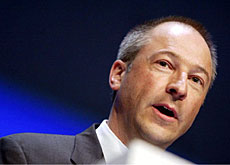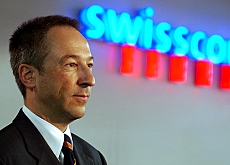Swisscom “must expand abroad to survive”

Swisscom has suffered "significant damage" recently and must get its foreign acquisition plan back on track to survive, chief executive Jens Alder tells swissinfo.
Alder condemned the government’s interference and called for a clear-cut relationship between Swisscom and the federal authorities, which have a 66 per cent controlling interest.
Swisscom said on Monday that it has ended negotiations to buy Irish telecoms company Eircom after being instructed by the government’s representative on the board that the proposed deal was too risky.
Furthermore, the company will not be permitted to take over any overseas telecoms firms that have a public service function in both fixed-line and mobile services at least until December 21, after which the government will publish a plan for Swisscom for the next four years.
This followed an announcement by Finance Minister Hans-Rudolf Merz that the government wants to sell its controlling stake in Swisscom.
swissinfo: How much damage has Swisscom suffered over the past two weeks?
Jens Alder: We have suffered significant damage in terms of credibility as a negotiation partner.
swissinfo: How important is it for Swisscom to buy foreign companies to remain competitive?
J.A.: We need to invest abroad within the next four years to support our existing Swiss-based business and to grow. The crisis we are experiencing right now is a result of that strategy being barred.
If there is an absolute no to foreign investments in the next four years then our position in Switzerland will not be sustainable.
swissinfo: Is there a danger that Swisscom will lose ground to its competitors?
J.A.: In an international context there is no doubt that Swisscom has now lost ground because there are other companies in Europe that are continuing their acquisitions and they will grow as a consequence.
Swisscom, for the time being, has lost the opportunity that we have been working on for more than a year [to buy foreign firms including Eircom].
swissinfo: Can politicians and businessmen work together in this company?
J.A.: What we need is a clear-cut established process that confirms whether or not legitimate interests, for instance the shareholders, can influence the company’s strategy.
The telecommunications company law states that the government can come up with strategic goals that are valid for four years. By accident they are running out at the end of this year and new ones are right now in discussion for the next four years.
With that process it is legitimate to discuss whether or not foreign investments should be pursued.
swissinfo: You have criticised “blanket allegations” that were recently made by the government. Can you expand on this?
J.A.: We are deeply convinced that the strategy we have been pursuing is the best for the company and the shareholders. Any criticism of that needs a proper argument and not just criticism. I couldn’t see any substantial argument to back the criticism.
If somebody says that the telecoms industry is a bad industry in the long-term, then I reject that because it is a highly attractive industry. There is no doubt that this is an industry with a lot of challenges, but we have a plan and we were executing that plan not too badly to make sure we survive.
swissinfo: How close were you to resigning?
J.A.: I would not like to convey to the press what I have been feeling in the past two weeks. The one thing that is clear is that my responsibility is to stay on until we get a new course for the ship. Then we will see what happens.
swissinfo-interview: Matthew Allen in Zurich
The government announced on November 24 its intention to sell its 66 per cent controlling stake in Swisscom.
One day later, the government blocked all foreign acquisitions by the company.
The federal authorities will produce their four-year strategy paper on Swisscom by December 21.

In compliance with the JTI standards
More: SWI swissinfo.ch certified by the Journalism Trust Initiative












You can find an overview of ongoing debates with our journalists here . Please join us!
If you want to start a conversation about a topic raised in this article or want to report factual errors, email us at english@swissinfo.ch.